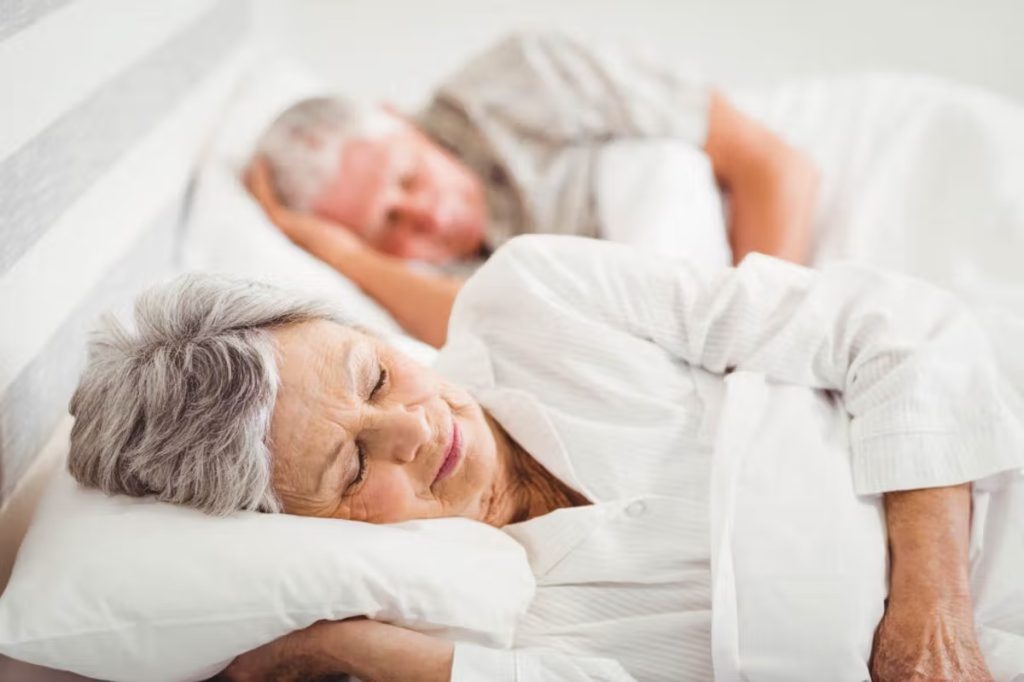Understanding Sleep Changes with Age
Sleep is essential for overall health, but as people age, they often notice changes in their sleep patterns. Many seniors find it harder to fall asleep, wake up more often during the night, or feel less rested in the morning. These changes are normal, but they can be frustrating. Good sleep is important for memory, mood, and physical health, so finding ways to improve sleep quality is a key part of staying healthy and active.
As people get older, the body produces less of the sleep hormone melatonin. This can make it more difficult to stay asleep. Other factors, such as medications, health conditions, and lifestyle habits, can also affect sleep. While aging naturally changes sleep patterns, there are many ways to improve sleep quality and wake up feeling more refreshed.
Creating a Consistent Sleep Schedule
One of the best ways to improve sleep is by following a regular sleep schedule. Going to bed and waking up at the same time every day helps the body develop a routine. When sleep happens at the same time each night, the body’s internal clock works more efficiently, making it easier to fall asleep and stay asleep.
Napping too much during the day can make it harder to sleep at night. If a nap is needed, keeping it short—around 20 to 30 minutes—can prevent it from interfering with nighttime sleep. A good balance between activity and rest throughout the day supports a natural sleep cycle.
Creating a Comfortable Sleep Environment
The bedroom plays a big role in sleep quality. A quiet, dark, and cool room makes it easier to relax. Soft lighting and blackout curtains can help create the right atmosphere for sleep. A comfortable mattress and pillows that support the body properly also make a difference.
Reducing noise and distractions in the bedroom improves sleep. A white noise machine or soft music can help block out sounds that might wake someone up. Keeping electronics, such as TVs and smartphones, out of the bedroom encourages better rest. The goal is to make the bedroom a peaceful place meant for sleep.
The Role of Diet and Hydration in Sleep
What a person eats and drinks can affect sleep. Heavy or spicy meals before bedtime may cause discomfort and make it harder to fall asleep. Instead, eating a light evening meal with healthy foods, such as fruits, vegetables, and whole grains, supports better sleep.
Caffeine and alcohol can also interfere with sleep. Caffeine, found in coffee, tea, and chocolate, stays in the body for hours and can keep people awake. Alcohol may make someone feel drowsy at first, but it disrupts sleep later in the night. Drinking herbal teas or warm milk instead of caffeine or alcohol can help the body relax before bedtime.
Hydration is important, but drinking too much water before bed may lead to frequent trips to the bathroom. Limiting liquids in the evening can reduce sleep interruptions.
The Impact of Physical Activity on Sleep
Regular physical activity helps improve sleep by reducing stress and promoting relaxation. Even light exercises, such as walking or stretching, make a difference. Exercise releases feel-good chemicals in the brain that help people fall asleep faster and stay asleep longer.
It is best to exercise earlier in the day rather than right before bed. High-energy activities too close to bedtime can make it harder to wind down. A good routine includes staying active during the day and allowing time to relax in the evening.
Managing Stress and Anxiety for Better Sleep
Stress and worry can make it hard to fall asleep. The mind keeps racing, making relaxation difficult. Practicing relaxation techniques, such as deep breathing, meditation, or gentle stretching, helps calm the mind before bedtime.
Writing down thoughts in a journal or making a to-do list for the next day can also ease worry. When the mind feels more organized, it is easier to let go of stress and fall asleep peacefully. A relaxing bedtime routine signals to the body that it is time to rest.
Limiting Screen Time Before Bed
Using electronic devices before bed can interfere with sleep. The blue light from screens, such as smartphones, tablets, and TVs, reduces melatonin levels, making it harder to feel sleepy. Turning off screens at least an hour before bed helps the body prepare for sleep naturally.
Instead of watching TV or scrolling on a phone, reading a book, listening to calming music, or practicing deep breathing exercises can be a better way to wind down. Creating a relaxing bedtime routine without screens improves sleep quality over time.
The Role of Medications and Sleep Disorders
Many seniors take medications for different health conditions, and some of these medications can affect sleep. If sleep problems are ongoing, talking to a doctor about medications and their side effects can help. Sometimes, adjusting the timing of a medication or switching to a different one can improve sleep.
Sleep disorders, such as sleep apnea or restless leg syndrome, are common in older adults. These conditions can cause frequent wake-ups and poor-quality sleep. A doctor can help diagnose and treat these issues, leading to better rest. Treating underlying sleep disorders is an important step in improving sleep quality.
Conclusion
Getting good sleep is essential for staying healthy and feeling good throughout the day. While sleep patterns change with age, there are many ways to improve sleep quality. A regular sleep schedule, a comfortable bedroom, healthy eating, and physical activity all contribute to better rest. Managing stress, limiting screen time, and checking for medication side effects also play a role.
By making small changes to daily habits, seniors can enjoy deeper, more restful sleep. Good sleep improves memory, mood, and overall well-being, making it easier to stay active and engaged in life. With the right approach, restful nights and energized days are within reach at any age.


